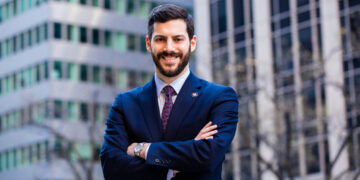
By Gus Saltonstall
I do not make wishes when the clock hits 11:11.
While many have lucky associations with the number 11, it holds a very different place in my world.
On November 11, 2011, I was diagnosed with Type 1 Diabetes.
In other words, on 11/11/11, I found out that I had an autoimmune disease with the number 1 in it. The diagnosis happened in the morning, and my family tells me it was just after 11 a.m. when the doctor delivered the news.
At the time, I had recently turned 16 years old. I was 6’2 and weighed just 125 pounds. For the prior few months I had a strange set of growing symptoms that I had written off as nothing too serious or not connected.
I was thirsty all of the time. My eye sight had worsened. My skin was drier than usual. My feet tingled every once in a while. I was so tired.
When we noticed the weight loss, we went to the doctor. A normal blood sugar sits between 80 and 120. Mine was 585. We were immediately sent to the emergency room. The doctors said I was lucky to have not fallen into a coma.
On that morning, I remember my dad calling his office to tell them he would not be in on that day because, “my son was just diagnosed with diabetes.” Even now, I also remember having a visceral negative reaction to him sharing my new found condition.
I didn’t want anybody to know.
The aversion to people knowing about my new diagnosis stayed with me. It took a month to tell my closest friends. As the time went on, it would continue to badly bother me if a friend or family member told somebody new that I was a diabetic. I wanted to control that information.
On some level, it was shame.
The idea that if people knew I had diabetes, they would think of differently, they would think of me as sick, they would think of me as lesser.
As I went through the end of my teenage years and into my early twenties, it seemed like I could group others with Type 1 Diabetes, which generally gets diagnosed in adolescence, into two groups. Those that I felt made it large parts of their identity, posted about it on social media, and would be quick to share about the disease; compared with those where you would never know they had diabetes unless you stumbled into them at a doctor’s visit.
I used to have a strong opinion on these differing approaches, but what I’ve realized is there is no right or wrong formula to living with a chronic condition. People need to find what works best for them. But, I know I’ve struggled with how much to make diabetes a part of my outward identity.
I already have multiple pieces of equipment hanging off of me, I already have to change my insulin needle every two to three days, I already have to count my carbs before every meal, I already have calloused over finger tips from checking my blood sugar, I already have to keep a constant companion of cranberry juice with me where I go, and I already have multiple apps on my phone constantly running to help me best manage.
How much do I really need to talk about it?
But, I’ve also come to learn learn that having any sort of shame over a medical condition is neither fair to yourself nor productive in helping you best manage whatever that condition might be.
So, as we approach November 11, 2024, which will 13 years of living with my diabetes, I’m glad to say I no longer shudder at the thought of sharing this all with you.
Subscribe to West Side Rag’s FREE email newsletter here.









There are so many types of bravery in this world.
Thank you so much for your courage in writing this, Gus. This is a beautifully written, moving, touching essay, and will mean so much to so many. Each time someone comes forward as you have done, so eloquently, it will help others to do the same — and perhaps find emotional support and help that they didn’t know they needed.
As you sensitively noted, sharing is not for everyone. But there are those will benefit so greatly from it, if they allow themselves to do so. You have helped them to do so.
Thanks for that.
Good on you, Gus, you’ve freed yourself. Wishing you robust health management through science and community support.
Always beautiful work – by a beautiful person.
Thank you for sharing.
What a powerful story about your own emotional transformation through a diagnosis that can bring a range of emotions including a desire for privacy and control.
Thank you for openly sharing about having an autoimmune disease…which so many of the readers (including me) can relate to. You are not alone. Wishing you good health!
Good for you. It is certainly up to you whether to share this type of personal information or not. I have dealt with health issues as well and have found that sharing the info usually results in less of a shock response than I had anticipated.
Gus. Thanks for this. I’ve learned a whole lot about diabetes from you. David
You are strong and brave. It is never easy to receive a life changing diagnosis. Your sharing will help others. One day at a time is sometimes all we can handle, Your eloquent words show how you were able to navigate your new world beyond that. May science continue to develop and may a cure be found. Thank you for sharing. Wishing you well, always.
Did the doctors ever explain to you why someone with a healthy weight and diet gets diabetes?
Hi Jane, thank you for reading. Type 1 is different from Type 2 Diabetes, as it is generally diagnosed at a young age and is genetic/autoimmune disorder, opposed to Type 2, which is a metabolic one and generally associated with lifestyle factors. Type 1 diabetes makes up just 6 percent of all diabetics in the United States.
Plea to parents: see Jane’s question and remember it, and remember Gus’s helpful answer, when you hear of kids your kids know who have diabetes. Do not make that so so common assumption that anyone’s diabetes is type 2, and is related to diet and weight. Too many thoughtless parents will make comments their own children hear and then pass on, adding to the stigma, misconceptions, and “explainer pressure” suffered by young people trying to manage their diabetes. There are 2 kinds, most commonly. Kids diagnosed in addle are often suffer From type I. And, diabetes of any kind is tough to manage.
I admire your strength, Gus. Teenage years are hard to begin with. How did you manage high school with everything that was going on?
I adore you as do my entire family. There are times in your young life that I did not know what I would have done without you. You are my 3rd son, an inspiration, smart and funny and so loving. I am grateful you are here Gus Saltonstal. 🥰🥰🥰🥰🥰🥰🥰🥰
Hope you weigh a lot more now!